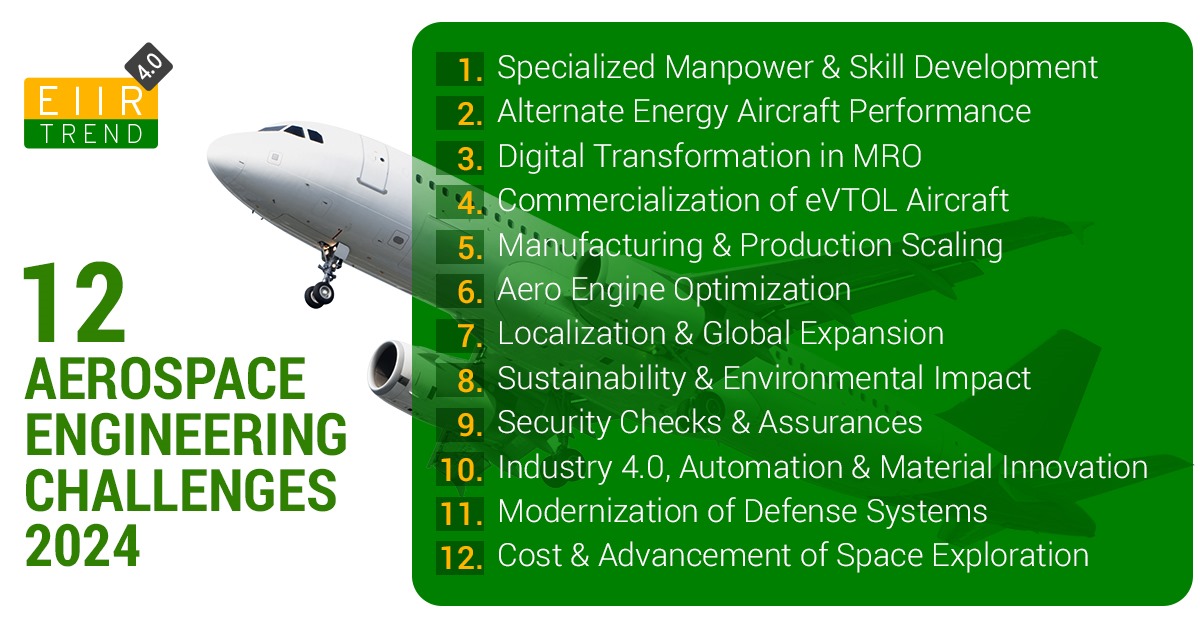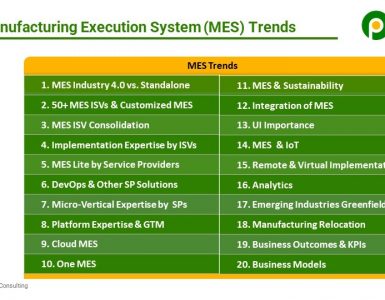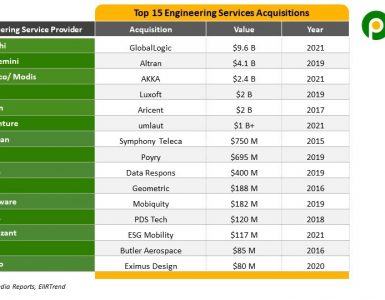The aerospace industry is at the forefront of technological innovation, addressing complex challenges to meet the growing demands of air transportation, defense, and space exploration. With rapid growth, the industry faces a range of engineering challenges. This note discusses twelve key engineering challenges that aerospace firms must navigate to sustain growth and innovation.

1. Specialized Manpower and Skill Development The aerospace sector is experiencing significant growth, with OEMs such as Airbus planning to hire 13,000 people in a year to meet production demands. Other aerospace firms, like Thales, have also announced aggressive hiring plans. Finding specialized engineering talent for aerospace is challenging, as the industry has not been the top choice for engineering talent for many years. The pandemic period and subsequent layoffs did not help enhance its reputation as an attractive sector. The challenge extends beyond immediate numbers and requirements to include developing specialized skills necessary for advancing aerospace technologies in the future.
2. Alternative Energy Aircraft Performance Innovations in aircraft performance, especially through the use of alternative energy sources like solar and hydrogen, are pivotal. The engineering feasibility of these technologies and securing initial clients pose significant challenges. Aerospace firms are actively engaging in R&D to make these sustainable options viable for commercial aviation.
3. Digital Transformation in MRO Digitalization, particularly in Maintenance, Repair, and Overhaul (MRO), is crucial for enhancing operational efficiency. The availability of MRO data for prediction, analysis, and execution is important. Aerospace firms are looking for programs, projects, and activities to improve operations and increase efficiency in their MRO operations.
4. Commercialization of eVTOL Aircraft The rapid commercialization of electric Vertical Take-Off and Landing (eVTOL) aircraft requires substantial capital and innovation in reducing costs and conducting comprehensive tests quickly. Developing infrastructure, such as Vertiports, is part of the broader challenge of creating a sustainable urban air mobility ecosystem.
5. Manufacturing and Production Scaling Increasing the production rate while maintaining quality and adaptability to engineering changes is crucial. Aerospace firms are leveraging advanced manufacturing technologies and digital integration to scale up production efficiently.
6. Aero Engine Optimization Reducing the cost and improving the quality of aero engines are ongoing challenges. Aerospace companies are investing in new technologies and manufacturing processes to enhance engine performance and efficiency, aiming for cost reduction and improved quality.
7. Localization and Global Expansion Balancing global expansion with localized manufacturing and R&D investments, especially in key markets like India, UAE, Saudi Arabia, and China, is essential. Localization helps meet regional demands and leverages local talent, contributing to global growth strategies.
8. Sustainability and Environmental Impact Reducing the digital and physical carbon footprint is a significant challenge. Aerospace firms are researching Sustainable Aviation Fuel (SAF), integrating renewable energy sources, and adopting sustainable manufacturing practices to achieve net-zero operations.
9. Safety Checks & Assurances Recent incidents in commercial aircraft have highlighted the importance of safety. These issues span across engines, aerostructures, and avionics and relate to design, testing, manufacturing, and operations. From an engineering perspective, these firms need more inspections, testing, and quality checks in all phases, whether in design, manufacturing, or operations.
10. Industry 4.0, Automation, and Material Innovations Implementing Industry 4.0 technologies, such as 3D printing and robotic inspections, improves manufacturing efficiency and product quality. Researching advanced materials and developing scalable manufacturing processes are vital for producing next-generation aircraft.
11. Modernization of Defense Systems Defense firms must continuously innovate to stay ahead, modernize defense systems, and manage the lifecycle of defense components efficiently. They need to embrace digital engineering and Model-Based Systems Engineering (MBSE) extensively to increase velocity in product engineering.
12. Cost and Advancement in Space Exploration Managing the expectations of the increasing volume of space exploration requires cost optimization, developing reusable components, standardization, and advanced technology usage.
The aerospace industry's engineering challenges are as diverse as they are complex, ranging from manpower development to integrating cutting-edge technologies. Addressing these challenges requires strategic investment in innovation, skilled workforce development, and sustainable practices. As the industry evolves, its ability to navigate these challenges will dictate the pace of technological advancement and market leadership in the global aerospace sector.
Bottom Line: Every challenge presents opportunities. Aerospace firms can collaborate with partners, such as engineering service providers, software vendors, startups, and academic institutions, to capitalize on these opportunities. Through joint efforts, ongoing R&D, and embracing digital transformation, aerospace companies can confront these challenges directly, steering the industry towards a future that is more efficient, sustainable, and technologically advanced
For more details on Aerospace Trends and how aerospace enterprises, software providers, and engineering service providers are solving these challenges, refer to our Aerospace Engineering Trends Report. (Refer here)






 Pareekh Jain
Founder of Pareekh Consulting & EIIRTrends
Pareekh Jain
Founder of Pareekh Consulting & EIIRTrends
Add comment